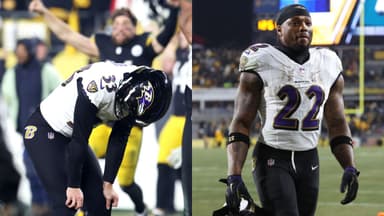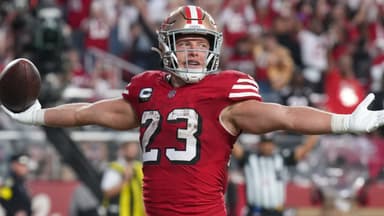Over the last decade, the running back position, once a key pillar of the NFL, has been severely devalued. However, as most trends are, this could simply be cyclical. A major exodus of running backs this past offseason has shown that they have a much larger impact on success than most analytics nerds and offensive coordinators would like to admit. But not Tony Dungy.
Advertisement
The Super Bowl-winning head coach and current NFL pundit couldn’t stop showering praise on Derrick Henry and Saquon Barkley, both of whom have seen major resurgences after switching teams during the spring. Dungy believes that both running backs have been the catalysts for a reshaping of the narrative surrounding RB value.
“[My old boss] used to say, ‘We can draft good players, but we need to pay for special.’ And I think we’ve seen this year, Saquon Barkley is special. Derrick Henry is special. Josh Jacobs is special. And it’s easy to say ‘Oh, we’ll get another guy like that’, but they don’t grow on trees,” Dungy said.
“And so, sometimes you might have to change your philosophy and pay those guys. And I think Philadelphia and Baltimore are very, very happy they paid those two,” he continued.
View this post on Instagram
Dungy’s comments were supplemented by two-time Super Bowl champion Rodney Harrison, who was also present on the SNF on NBC podcast along with Jac Collinsworth. The hard-hitting safety made the point that, from a defensive perspective, RB was always a premium position to them because the ability to not be one-dimensional on offense was so crucial. But clearly, things have changed significantly.
Pass-happy offensive coordinators have devalued the running back
It used to be that running backs won all the big awards and got paid among the best in the NFL. Not so anymore. The shift to a more pass-focused league has devalued the running back position to such a massive extent that in 2023, running backs averaged a lower salary ($1.81 million) than their kicker counterparts ($2.26 million).
That is simply not right. And while we understand that this is a business, the cost-benefit analysis of running backs is a little too cold. RBs face more punishment than perhaps any other position on the field, so by that logic, they should get paid more, right? The harder the job, the higher your pay. That’s why deep-sea welders get paid so much: their job is very dangerous.
But it’s the opposite in the NFL. The fact that RBs play the most dangerous position works against their value, as it leads to more injuries. As a result, they are paid less. It used to be that the value of a back in the running game would make the injury risk worth it, but now teams believe they can find a starting running back anywhere in the draft or free agency and pay bargain prices.
This is also something of a symptom of the “big-brained offensive coordinator” that has taken over the NFL. These guys are undoubtedly good at their craft, and some of them are geniuses. However, sometimes they are too smart for their own good, always trying to do something fancy instead of pounding the rock.
And even when they do pound the rock, they like to think that the plays work because of the scheme they drew up, rather than the individual skill of the running back.
As Dungy pointed out, this past offseason changed all that. Many top running backs flocked to new teams in 2024, so we can get a much clearer idea of how much running backs really impact winning — because that is the bottom line at the end of the day.
The picture painted here is a stark one.
The New York Giants let Saquon Barkley, their best player, walk because they didn’t want to pay him $12 million a year, which is barely more than they’re paying mediocre linebacker Bobby Okereke and serviceable guard Jon Runyan. The Philadelphia Eagles gave Barkley what he wanted, and they’re now soaring on Barkley’s back. Here are a few more examples to chew on (current records in brackets):
- Saquon Barkley: Left Giants (2-9) and signed with Eagles (9-2)
- Derrick Henry: Left Titans (3-8) and signed with Ravens (8-4)
- Josh Jacobs: Left Raiders (2-9) and signed with Packers (8-3)
The Aaron Jones example is worth considering as well. Jones left the Packers, but they signed Jacobs, so they’re doing well this year. The veteran RB then signed with the Vikings, who had no RB1 to speak of last year and struggled to a 7-10 record. Now, with a reliable running back, they sit at 9-2. Obviously, the RBs are not responsible for the turnaround by themselves, but they’re certainly a big factor.
To illustrate this point, seven of the top eight rushing attacks belong to teams with winning records through 12 weeks. Six of those seven have 7+ wins.








